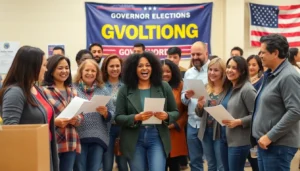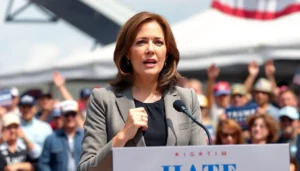Elections can feel like a circus, complete with clowns, acrobats, and that one guy who insists on juggling flaming torches. But behind the spectacle lies a serious conversation that impacts everyone’s lives. Talk elections isn’t just about the candidates’ dance moves on the debate stage; it’s about engaging in the dialogue that shapes communities and futures.
As the election season heats up, it’s time to bring the conversations off the sidelines and into the spotlight. Whether it’s discussing policies over coffee or debating the latest campaign ads, every voice matters. So grab your popcorn and get ready to dive into the world of talk elections, where opinions clash, laughter ensues, and the fate of the nation hangs in the balance.
Table of Contents
ToggleOverview of Talk Elections
Talk elections serve as a significant platform for community engagement during the electoral process. These discussions encourage citizens to voice their opinions and share their insights. Engaging in discussions provides opportunities for individuals to understand different perspectives and foster constructive dialogue.
Elections generate conversations not only at formal events but also in everyday settings. Every opinion shared contributes to collective understanding and informs community decisions. By participating in talk elections, individuals can influence local and national narratives effectively.
Media outlets and social platforms play essential roles in facilitating discussions. With real-time updates and diverse viewpoints, these platforms ensure that conversations remain relevant and timely. Engaging in talk elections online increases accessibility for those unable to attend in-person events.
When individuals come together to discuss elections, they can clarify misconceptions and challenge biases. Such exchanges promote critical thinking and inform voters about issues that matter most to them. Diverse voices lead to richer conversations, creating a more informed electorate.
Polling data shows that community engagement rises with increased discourse. When conversations thrive, voter turnout typically follows suit. Individuals participating in these dialogues are more likely to cast their ballots, ultimately shaping democratic outcomes.
Understanding the impact of one’s voice in elections strengthens the democratic process. Each discussion can spark interest and motivate others to learn and involve themselves. Talk elections embody the spirit of democracy, reminding everyone of the essential role their contributions play in shaping a better future.
Importance of Talk Elections
Talk elections create crucial platforms for community engagement throughout the electoral process. Through discussions, citizens voice their opinions and share insights, blending understanding with dialogue.
Engaging Voters
Engaging voters becomes vital when electoral values are put forth. Casual conversations in everyday settings enhance participation and attendance at polls. Encouraging dialogue fosters voter enthusiasm and a sense of responsibility. Polling shows that communities with open discussions see increased voter turnout. Interactions on social media amplify outreach, ensuring voters remain informed and involved. Engagement isn’t limited to formal debates; it flourishes in informal gatherings as well.
Shaping Public Opinion
Shaping public opinion hinges on informed discourse surrounding elections. Conversations help clarify misconceptions and challenge biases among groups. Impactful discussions promote critical thinking, allowing voters to understand issues deeply. Media outlets and social platforms provide avenues for sharing diverse perspectives in real-time. Greater exposure to varied viewpoints cultivates empathy and awareness, altering perceptions about candidates and policies. By actively participating in these exchanges, individuals help mold the collective stance on important issues.
Key Players in Talk Elections
Several key players contribute to the dynamics of talk elections, creating a vibrant environment for dialogue and engagement.
Politicians
Politicians serve as significant figures within election discussions. They present their platforms, values, and priorities, influencing public perception. Engagement with constituents occurs at rallies, town hall meetings, and social media interactions. These interactions provide opportunities for citizens to voice concerns and ask questions. Campaign strategies often adapt based on ongoing conversations, demonstrating responsiveness to community needs. Through transparent communication, they build trust and encourage dialogue, reinforcing their role in the electoral process.
Media Influence
Media outlets greatly impact talk elections. Coverage of candidates, issues, and voter sentiment shapes public opinion. News articles and broadcast segments frame discussions, helping citizens stay informed about political developments. Social media platforms create spaces for real-time conversations among voters, allowing diverse perspectives to emerge. Moreover, blogs and podcasts offer in-depth analysis, contributing to a better understanding of complex issues. Timely reporting from credible sources ensures that citizens engage with accurate information, fostering informed discussions in their communities.
Strategies for Successful Talk Elections
Engaging in discussions about elections requires thoughtful strategies to ensure effective dialogue and community involvement.
Effective Communication
Clear communication builds understanding. Voters need concise messages that highlight key issues and candidate positions. Conversations should focus on relevant topics while encouraging diverse opinions. Listening actively allows participants to address concerns and clarify misconceptions. Utilizing open-ended questions can stimulate deeper discussions and foster engagement. Individuals must strive to create a welcoming environment where all voices feel valued. Setting boundaries around respectful dialogue ensures that discussions remain constructive. When people communicate effectively, they contribute to a culture of informed decision-making.
Utilizing Social Media
Social media platforms offer powerful tools for discussion. Engaging on platforms like Twitter, Facebook, and Instagram amplifies voter outreach. Sharing informative content enables users to stay updated on election-related news and events. Utilizing hashtags can connect conversations on specific topics while broadening audience reach. Hosting live Q&A sessions allows community members to interact directly with candidates and experts. Creating shareable graphics can simplify complex information and drive engagement. Consistent posting about election dates and resources mobilizes voters and encourages participation. By harnessing social media, communities can foster informed conversations and drive higher voter turnout.
Challenges Faced in Talk Elections
Engaging in talk elections involves navigating several challenges that can hinder meaningful dialogue.
Misinformation
Misinformation spreads quickly during elections, impacting public perception and decision-making. Social media platforms often amplify false narratives, leading to confusion among voters. Individuals may encounter misleading statistics or fabricated claims that distort candidates’ positions. This phenomenon complicates the ability to have informed discussions. Combating misinformation requires vigilance and fact-checking from reliable sources. Moreover, educating the community on discerning accurate information enhances discourse quality. Encouraging citizens to share verified content can help counteract the spread of falsehoods. Ultimately, fostering an environment of critical thinking contributes to stronger, more informed talk elections.
Polarization
Polarization presents a significant barrier to effective election conversations. Differing political ideologies often create divisions, making it difficult for individuals to engage with opposing viewpoints. Heated exchanges may arise when participants are unwilling to consider alternative perspectives. This divisiveness stifles productive dialogue and limits collaboration. Promoting civil discourse can help mitigate polarization and encourage a more inclusive environment. Creating spaces for dialogue that prioritize respect fosters open communication. Involvement of moderating figures can facilitate conversations that bridge gaps. Building a culture of understanding enhances collective decision-making and strengthens democracy through genuine engagement in talk elections.
Engaging in talk elections is vital for a thriving democracy. By participating in discussions about elections individuals contribute to shaping their communities and influence the future. Every conversation counts whether it’s a casual chat or a structured debate.
The role of media and social platforms in facilitating these dialogues cannot be overstated. They provide the tools necessary for informed discussions and help combat misinformation.
As the election season unfolds it’s crucial for everyone to voice their opinions and stay engaged. Together they can create a more informed electorate and ensure that every vote truly matters in the democratic process.





